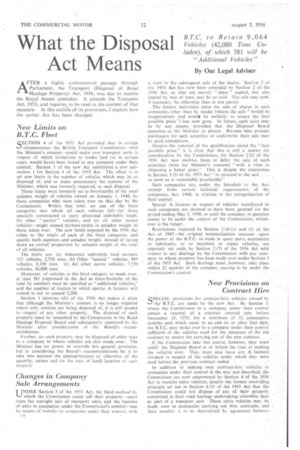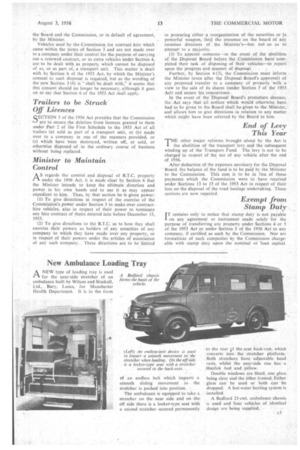What the Disposal Act Means
Page 42

Page 43

If you've noticed an error in this article please click here to report it so we can fix it.
By Our Legal Adviser
AFTER a highly controversial passage through Parliament, the Transport (Disposal of Road Haulage Property) Act, 1956, was due to receiVe the Royal Assent yesterday. It amends the Transprn,1 Act, 1953, and requires to be read in the context of that measure. In this outlitie of its provisions, .1 explain how the earlier Ac( has been changed.
New Limits on B.T.C. Fleet
SECTION 4 of the 1953 Act provided that in certain circumstances the British. Transport Commission—with the Minister's consent—could make over transport units in respect of which invitations to tender had (or in certain cases, would have) been issued to any company under their control. Section 1 of the new Act substitutes a new subsection 1 for Section 4 of the 1953 Act. The effect is to set new limits to the number of vehicles which may be so disposed of, and to make unnecessary the consent of the Minister, which was formerly required, to such disposal.
Those limits were formerly set at five-fourths of the total unladen weight of vehicles owned on January 1, 1948, by those companies who were taken over on that day by the Commission. Within that total. no one of the three categories into Which all such vehicles fell—fa) those specially constructed to carry abnormal indivisible loads; (b) other " special " vehicles, and (c) all other motor vehicles--might exceed thirteen-tenths in unladen weight of those taken over. The new limits imposed by the 1956 Act relate to the totals of each of the three categories and specify both numbers and unladen weight, instead of laying down an overall proportion by unladen weight of the total of all vehicles.
The limits are: (a) Abnormal indivisible load carriers, 325 vehicles, 2,750 tons; (b) Other "special" vehicles. 989 vehicles, 3,330 tons. (c) All other motor vehicles, 7,750 vehicles, 36,000 tons, .
Moreover, of vehicles in the third category to made over, at least 581 (expressed in._the .Act as three-fortieths of the total by number) Must be specified as "additional vehicles," and the nurnber of trailers to which special Alicences will extend is not to exceed 3,200.
Secticin 1 (proviso' (d)) of the 1956 .Act makes it plain that although the Minister's consent is no longer required where only vehicles are being disposed of, it is still needed in respect of any other property. The disposal of such prOperty mint be submitted by the Commission to the Road Haulage Disposal Board and subsequently approved by the Minister after consideration of the 13oar4's recom mendations. .
Further, no such property May be disposed of other than to a company to whom vehicles are also made. over. The Minister has no power to override this general provision, but in considering the Board's recommendations he is to take into account the appropriateness or otherwise of the quantity, nature and (in the case of land) location of such property
Changes in Company Sale Arrangements
UNDER Section 5 of the 1953 Act, the third method by which the Commission could sell their property—apart from the outright sale of transport units and the transfer of units to companies under the Commission's control—was by means of transfer to companies under their comrol. with a view to the subsequent sale of the shares. Section 5 of the 1953 Act has now been amended by Section 2 at the 1956 Act, so that not merely " share" capital, but also capital by way of loan. may be so sold. The sale may now. if necessary, be otherwise than in one.parcel.
The former restriction upon the sale of shares in such companies other than by tender (where the sale "would be inappropriate and would be unlikely to secure the best possible price ") has now gone. In future, such sales may be by any means. provided that the Disposal Board approves or the Minister so directs. Persons who procure purchasers for such securities or underwrite their sale may be paid commission.
Despite the removal of the qualification about the "best possible price," it is clear that this is still a matter for consideration by the Commission, for Section 2(2) of the 1956 Act now enables them to defer the sale of such securities (with the Minister's consent) " with a view to obtaining a better price." This is despite the instruction in Section 5 (3) of the 1953 Act " to proceed to the sale . . . as soon as is reasonably practicable."
Such companies are, under the Schedule to the Act, exempt from certain technical requirements of the companies Act, 1948, in relation to the reorganization of their capital.
Special A licences in respect of vehicles transferred to such companies are deemed to have been granted for the period ending May 5, 1958, or until the company in question ceases to he under the control of the Commission, whichever is the longer.
Restrictions Unposed by Section 2 (4) (c) and (f) of the Act at 1947—the original nationalization measure-upon the power of the B.T.C. to trade in spare parts, -accessories or lubricants, or -to maintain or repair vehicles, are expressly set aside by Section 2 (7) of the 1956 Act with respect to any dealings by the Commission with any company to whom property has been made over under Section 5 of the 1953 Act. Such dealings must, however, take place within 12 months of the company ceasing to be under the Commission's control.
New Provisions on Contract Hire
QPECIAL provisions for contract-hire vehicles owned by the B.T.C. are made by the new Act. • By Section 3, where the Commission or a company under their control obtain a renewal of a contract entered into before December 15, 1955, for a minimum of .12, consecutive months,. and which came to an end on or after that date, the B.T.C. may make over to a company under their control sufficient of the vehicles used for the purposes of the old contract to ensure the carrying out of the new contract.
If the Commission take this course, hoWever, they must notify the Disposal Board at or before the time of making the vehicles over. They_ must also have any A licences revoked inrespect of the vehicles under which they were used before the preVious contract ended.
In addition to making over contract-hire vehicles to companies under their control in the way just described, the Commission are now empowered by Section 4 of the 1956 Act to transfer extra vehicles, despite the former overriding principle set out in Section 6(5) of the 1953 Aet that the Commission could not dispose of any of their .13ropert comprised in their road haulage undertaking otherwise than as part of a transport unit. .These extra vehicles may be made over to companies carrying out hire contracts, and their number is to be determined by agreement between
the Board and the Commission, or in default of agreement, by the Minister.
Vehicles used by the Commission for contract hire which came within the terms cif Section 3 and are not made over to a company under their control for the purpose of carrying out a renewed contract, or as extra vehicles under Section 4, are to be dealt with as property which cannot be disposed of as, or as part of, a transport unit. This matter is dealt with by Section 6 of the 1953 Act, by which the Minister's consent to such disposal is required, but as the wording of the new Section 3 (6) is "shall be dealt with," it seems that this consent should no longer he necessary, although it goes on to say that Section 6 of the 1953 Act shall apply.
Traders to be Struck Off Licences
QECTION 5 of the 1956 Act provides that the Commission are to secure the deletion from licences granted to them under Part 2 of the First Schedule to the 1953 Act of all trailers (a) sold as part of a transport unit, or (b) made over to a company in one of the manners provided, or (c) which have been destroyed, written off, or sold, or otherwise disposed of in the ordinary, course of business without being replaced.
Minister to Maintain Control
A S regards the control and disposal of 113.T.C. property rTh. under the 1956 Act, it is made clear by Section 6 that the Minister intends to keep the ultimate direction and power in his own hands and to use it as may appear expedient to him. Thus, by that section he is given power:
(1) To give directions in respect of the exercise of the Commission's power under Section 3 to make over contracthire vehicles, also in respect of their power to terminate any hire contract of theirs entered into before December 15, 1955.
(2) To give directions to the B.T.C. as to how they shall exercise their powers as holders of any securities of any company to which they have made over any property, or in respect of their powers under the articles of association of any such company. These directions are to be limited
to procuring either a reorganization of the securities or (a powerful weapon, this] the presence on the board of any .nominee directors of the Minister's—but not so as to amount to a majority.
(3) To appoint someone—in the event of the abolition of the Disposal Board before the Commission have completed their task of disposing of their vehicles—to report upon the progress and manner of disposal.
Further, by Section 6(3), the Commission must inform the Minister (even after the Disposal.Board's approval) of any proposed transfer to a company of property with a view to the sale of its shares (under Section 5 of the 1953 Act) and secure his concurrence.
In the event of the Disposal Board's premature decease, the Act says that all notices which would otherwise have had to be given to the Board shall be given to the Minister, and allows him to give directions in relation to any matter which might have been referred by the Board to him.
End of Levy This Year 'THE other major reforms brought about by the Act is I the abolition of the transport levy and the subsequent winding up of the Transport Fund. The levy is not to be charged in respect of the use of any vehicle after the end of 1956.
After deduction of the expenses necessary for the Disposal Board, the balance of the fund is t6 be paid by the Minister to the Commission. This sum is to be in lieu of those payments which the Commission were to have received under Sections 13 to 15 of the 1953 Act in respect of their loss on the disposal of the road haulage undertaking. These sections are now repealed.
Exempt from Stamp Duty
iT remains only to notice that stamp duty is not payable I on any agreement or instrument made solely • for the purpose of transferring any property under Sections 4 or 5 of the 1953 Act or under Section 3 of the 1956 Act to any company, if certified as such by the Commission. Nor are formations of such companies by the Commission chargeable with stamp duty upon the nominal or loan capital.




































































































